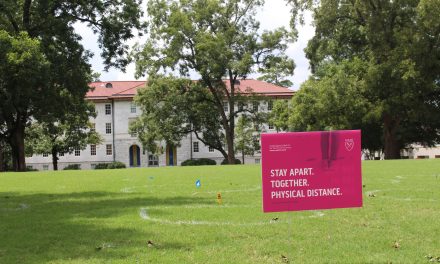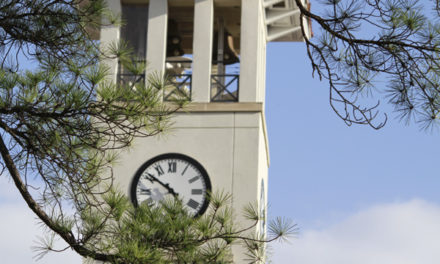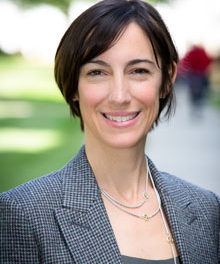March 6, 2013
Open Letter to the Emory University Community:
We, the undersigned faculty members of the English department, are writing to express our solidarity with those in our campus community–faculty, students, staff, and alumni–who have expressed outrage, dismay, and bewilderment at President Wagner’s recent Emory Magazine column “As American as . . . Compromise.” (Many of our junior and untenured colleagues, as well as staff members, wanted to sign this letter, but out of a shared sense of caution, we have restricted endorsement only to those who enjoy the privileges – and responsibilities – of tenure or senior faculty standing.)
The intellectual and moral shortcomings of President Wagner’s argument have been well dissected by others (and even, to a degree, by President Wagner himself). Beyond such analyses, the damage done to the university has been substantive. In the short term, we anticipate adverse consequences for the recruitment of faculty members and top-tier students. Serious academics will no doubt pause to question whether Emory is a suitable environment in which to pursue liberal arts training that promotes respect based on informed critical reasoning.
During this graduate admissions season, we have had to write to our admitted students to reassure them that President Wagner’s article in no way reflects our values, nor should it affect their training. Indeed, we have heard back from many of them that the article has been on their minds as they deliberate about whether to come to Emory rather than to accept other, highly competitive offers. One prospective student wrote back, “To call [the article] distasteful would be putting it lightly. Nevertheless, I am glad to hear that the Emory faculty has overwhelmingly condemned it.” Many prospective undergraduates and their families no doubt will share similar concerns.
Over the longer term, we foresee an enduring rift between our university’s presidential administration and the students, faculty, staff, and alumni whom his office is meant to represent nationally and internationally. As we have faced painful and awkward questions about our president from colleagues around the country, as well as from students in our classrooms, we have struggled to find constructive ways to address what the New York Times‘ headline proclaimed as a reopening of racial wounds at Emory. Nevertheless, a fundamental trust has been broken: namely, the faith that even when we disagree with our leaders, we believe that their decisions are based on sound reasoning, good judgment, and compassion.
The President has put himself – and us – in an untenable position by sending out an indefensible message in the name of our university. His apologies and public self-scrutiny have been understandable in response to the condemnations of his piece here on campus and in the national media. They do little, however, to mitigate the devastating impact of the original statement. Therefore, we ask that Emory’s Board of Trustees reflect deeply on what accountability for such damages would entail from an ethically engaged university.
Sincerely,
Deepika Bahri
Martine Brownley
Patricia Cahill
Jonathan Goldberg
Jim Grimsley
Geraldine Higgins
Lawrence Jackson
Abdul JanMohamed
John Johnston
Heather Julien
Walter Kalaidjian
Barbara Ladd
Valerie Loichot
Michael Moon
James Morey
Laura Otis
Walt Reed
Benjamin Reiss
Mark Sanders
Joseph Skibell
Natasha Trethewey
Deborah Elise White
Craig Womack
Kevin Young
The Emory Wheel was founded in 1919 and is currently the only independent, student-run newspaper of Emory University. The Wheel publishes weekly on Wednesdays during the academic year, except during University holidays and scheduled publication intermissions.
The Wheel is financially and editorially independent from the University. All of its content is generated by the Wheel’s more than 100 student staff members and contributing writers, and its printing costs are covered by profits from self-generated advertising sales.







How long is everyone going to focus on this for? He chose a bad example for his article. I’m really not impressed with the intellect of anyone who edited the piece before it was published. But this is a non-sense controversy. Why was it national news? And why are professors only now complaining about the administration. I assume that there is a lot of behind the scenes politics that the public doesn’t know about. Joe Biden made a racial gaffe before he was chosen as Obama’s running mate. Harry Reid made a racial gaffe as well. The Democratic party didn’t throw them under the bus for these mistakes. The reason that this incident will hurt the University is because faculty and students blew it out of proportion. Now some students on the left won’t want to go to Emory because they think there is a culture of racism, and other students won’t want to go because they want to avoid racial tension. If the faculty fires Wagner for this incident before the end of the year, it will just bring more media attention to Emory and the negativity will never end. The Emory community is really shooting itself in the foot. Wagner might not have done a great job as president, but the faculty is really dragging the school’s name through the mud.
Your grammatical mistakes alone make it clear that you didn’t spend enough time with any of the great professors listed above.
By “gaffe” are you referring to the 750 word essay Wagner drafted, had vetted by his staff, and then had printed in a magazine that goes out to 120K subscribers? Because that seems to stretch the meaning of “gaffe” more than a little.
Listen moron. I wrote, “He chose a bad example for his article. I’m really not impressed with the intellect of anyone who edited the piece before it was published.” I do think that it was stupid thing to write, and I think that whoever edited the piece sucks at their job. I used the word “gaffe” in reference to past comments by Joe Biden and Harry Reid, not in reference to Wagner’s piece. Your response was idiotic. I get that you disagree with me, but can you at least make some good points. I think that it is a joke that people are so offended by these kinds of things. At the end of the day, people who make a big deal about this kind of stuff are usually not content in their own lives and are looking for reasons to tear down others. Nobody is perfect, fix your own problems before worrying about non-sense like this. Even if Wagner resigns, you’ll still have to go back to living your shitty life. And I’m not a fan of Emory’s administration. They have done a terrible job in so many ways. But my biggest criticism of Wagner is that he is too nice of a guy and he allowed this culture of incompetence to continue. The faculty never tried to oust him over these issues. Maybe Wagner should be fired, but a lot of people at Emory should have been out of a job a long time ago.
“Even if Wagner resigns, you’ll still have to go back to living your shitty life. And I’m not a fan of Emory’s administration.”
This and the invective really reflects well on you – nice work!
Thank you! I’m not a politician like Wagner, so I don’t feel obligated to tell you lies that make you feel better. You can complain about racism all you want, but the only people who care work in academia. If you’re “still” bitter about slavery, it’s a choice. It’s sad to see how much you care that all white people feel guilty about slavery and take pity on you. If seeing yourself as a victim makes you feel better, go for it. But I don’t give a rat’s ass about your made up problems and most people who tell you they care are just lying. Life is unfair and you’re not guaranteed a happy ending like in a Disney movie. Sometimes the truth hurts.
I think you should elaborate more on how “you people” are looking for “pity.” I feel like you’re not doing adequate justice to what are no doubt some fascinating and insightful thoughts on race relations – please share them!
Lol, “you people? What do you mean ‘you people’?” Let’s not go there. I actually agree with this guy though. By writing yet another “the undersigned do hereby condemn Wagner,” the faculty are blowing this up more than it should be.
“Wagner might not have done a great job as president, but the faculty is really dragging the school’s name through the mud.”
Remember the time the faculty spent a decade misreporting Emory’s SAT scores to US News and World Report and to the US Department of Education? Or the time faculty wrote all our alumni an essay in which they unreflectively praised the accommodation of slaveholders as “noble” and “honorable” and animated by “higher aspirations”? Damn faculty, this whole place would be so much better if they just resigned and left administrators like Wagner to gleam in luminescent thought leadership.
In other words: Give me a break, bro. The faculty are coming up huge by speaking out – that’s what intellectual leadership and ethical engagement is supposed to be about.
You are correct that everyone has a right to be wrong, but no one has a right to be unfair. In the case of Professor Butler’s tenure-denial in German Studies, why did President Wagner claim the right to overrule two favorable faculty-votes (4-2; 15-0)? Provost Lewis is gone already…
Harry Reid’s and Joe Biden’s gaffes were verbal. Mr. Wagner’s was written; he had plenty of opportunity to think and hit backspace.
I completely and wholeheartedly agree with the first poster. This has been blown FAR out of proportion. To the extent that this harms the reputation of Emory, it is because the Philosophy and English departments have invited the negative publicity.
Totally! It’s not like the letter didn’t hit the news media a whole three weeks before this letter and two week’s before philosophy. And it’s not like there haven’t been multiple days of protest and countless other letters, too! But yeah sure let’s blame the faculty in those two Departments for writing letters in the college newspaper, why not.
Kudos to the faculty for standing up for decency.
In order for our community to heal, Wagner must go.
If the sanctimonious bull$hit produced by the College faculty could be harvested, our energy problems would be solved. Wagner made a mistake and he apologized for it. Who knew that infallibility wasn’t solely the province of the Vatican, but also the Emory President’s office?
And to correct the prospective student, the majority of the Emory faculty haven’t condemned Wagner’s words. The majority of the College faculty have. Why haven’t the Public Health, Law, Theology, Medicine, Business, and Nursing faculty expressed similar outrage? Perhaps they are not as ethically superior as the College faculty. Perhaps they are mature enough to acknowledge that people can make mistakes and atone for them. Or perhaps they don’t have the same axes to grind that the College faculty have.
Or perhaps those other schools you mentioned aren’t still smarting from budget cuts that violated every known principle of academic governance like the college is?
If you’re going to be investigated by the AAUP, the least you could do is not compare the subject of the investigation to the 3/5ths compromise. It was tasteless and stupid. The only reason people are rushing to Wagner’s defense is because they don’t want Emory to “look bad.”
Don’t miss the forest for the trees. Brushing Wagner’s ineptitude under the rug only guarantees that Emory will continue to look worse in the long term. He’s done absolutely nothing of substance for the school except build shiny new buildings and say “diversity” a lot.
1 month later and I still don’t get what he said wrong, I think it was an apt example. What’s so bad about the 3/5 compromise?
I’m asking in all seriousness, I would appreciate it if someone could lay it out for me logically.
Apparently I can’t post links in responses. But you should Google “Morehouse Director of African-American Studies on “Three-Fifths Compromise” Cited by Emory Pres.” and listen to the interview (the long version) on WABE; also search for “James Wagner’s “highest aspiration” at the New Inquiry (by Aaron Brady) and “Higher Education Ideology Wars: Who Is The “Slave”? by Tressie McMillan Cottom. Those pieces do a great job laying what’s what. You may also want to read a piece by Paul Finkelman at the Root. It’s called “Three-Fifths Clause: Why Its Taint Persists.”
Thanks a lot for all of this– I got through Finkleman’s work and will try and get through the rest to make sense of this when I have more time.
My pleasure. There’s been a ton of blogging about this and those pieces are particularly excellent. Another one to check out is at Al Jazeera, which summarizes some of the academic writing within a broader account of changes to the university and the contemporary political climate. Search for “Three Fifths of the American Dream.”
I’d like to add that I don’t the “intellectual and moral shortcomings” of what President Wager wrote have ever been discussed, people have always assumed that these are self-evident. Most letters like this criticize JWags but don’t really say why– if you read one, you’ve read them all.
Thus, in all honestly, I want to know why what he said was so offensive.
Again, you should read those pieces above. They do a much more thorough job of making clear what’s up with Wagner’s essay that so many find it offensive, and a more systematic way that could happen in a comments thread in the Wheel.
ok, but then also read this:
“One instance of constitutional compromise was the agreement to count three-fifths of the slave population for purposes of state representation in Congress. Southern delegates wanted to count the whole slave population, which would have given the South greater influence over national policy. Northern delegates argued that slaves should not be counted at all, because they had no vote. As the price for achieving the ultimate aim of the Constitution–”to form a more perfect union”–the two sides compromised on this immediate issue of how to count slaves in the new nation. Pragmatic half-victories kept in view the higher aspiration of drawing the country more closely together.”
Its what he originally said. His *point* wasn’t to praise the compromise, he even qualified it qualified it as “Pragmatic half-victories” and that it reached the “lowest common denominator”.
Are we really going to let this misinterpretation of his original intention tear up the university? This is what causes “outrage, dismay, and bewilderment” and “devastating impact ” and “enduring rifts” throughout the university.
you should all be ashamed of yourselves
i should have put a few question marks after university, whoops
way to miss the original intent: Wagner’s disingenuous *point* was to misrepresent the “reallocations” of departments and programs to alumni as the epitome of difficult “compromise” on campus for a higher, loftier purpose, when in fact it was a one-sided, secretive decision circumventing ethical norms and procedures related to faculty governance. What’s tearing up the university is his sanctioning and championing of Forman’s obliteration of programs and departments without due process and without clear or compelling reasons or any meaningful engagement with stakeholders. All for some nebulous, empty, “leader-speak” concept of pursuing “eminence.” That is a clear and stunning lack of fitness to lead. Leadership requires a lot more than “vision”; it’s ultimately grounded in trust. He has shown himself to be unworthy of that trust in his repeated blunders and manipulations regarding these ill-conceived and ill-enacted decisions, and Emory’s faculty should be outraged, dismayed, and bewildered.
What a lame attempt to create hackneyed debate. He made a minor mistake and then he apologized it. Now get over it. What he said just wasn’t that big of a deal guys, as much as you want to try to make one.
So, um, by minor mistake do you mean … writing a totally tone-deaf, ignorant, and racially problematic 750 word essay that went out to 120K people? Because for me a “minor mistake” is my forgetting to run my dryer or maybe not putting my car in park. Then again I don’t make 1.2 million a year, so maybe standards are different.
The AAUP and the EEOC have recently commented on President Wagner’s leadership in re violation of Emory standards on tenure in the German Department. This case is going to court.
Two other departments, Comp Lit and Women’s Studies, have published comments on their home pages.
I will attempt to explain why so much faculty criticism has focused on the president’s appalling “3/5 compromise” statement, then the botched apology, followed by Gary Hauk’s “white eyes” statement, and then the BOT chair’s misuse of a review of a work on Lincoln and compromise in the Salon.com piece. These statements are but the latest in a long list of matters that have frustrated many members of the faculty. I cannot speak for all members of the faculty. The fact, however, is that the College faculty, with about 200 members present, voted nearly unanimously to censure the president. The discussion revealed the widespread belief that the president’s actions over many years had severed his relationship with the faculty and that few feel that he is an effective leader or representative of the university.
How have we reached that point? The frustration (now outrage) has built over many years. It is not, as former Provost Early Lewis said in a recent article, that there are a handful of faculty members who are opposed to change. Instead, since the beginning of President Wagner’s term, we have sensed that he had little interest in, or knowledge of, the core work that the faculty undertakes, especially through its research and teaching. While he has paid lip service to the value of the liberal arts, that support has not been backed up by funds for the College or any increasing knowledge about our work. While he speaks about the value of the humanities, his description of them remains at the level of a high school understanding of those fields. It seems that he has little intellectual curiosity about any of the scholarship or programming for which this university is known. His office churns out cringe-worthy prose (“destination university”) that constitutes a direct affront to the kinds of training we try to give our students in composition. He gives the opening remarks at campus events and then leaves without taking advantage of the chance to learn anything at the event. His statements make it appear that he just skims along the surface, without recognizing the substance of our scholarship and the “courageous inquiry” that lie at the heart of any university. One might have overlooked that shortcoming when he first arrived, for he had an engineering background. His knowledge of vast areas of the work that we do, however, has remained superficial and embarrassingly so. Thus the “3/5 compromise statements” are seen as indications of how little attention the president and the people around him pay to the scholarship that has made Emory one of the best places in the country to study race, slavery and colonialism. As is often heard on campus, the president wants the PR value of these fields, but ignores their substance. How can the president of a major university, with superb programming, teaching and research on the racial history of the US, for instance, have benefited so little from one of the signature strengths of Emory? He wrote his column and did not say, “Let me ask one of my colleagues in that field to take a look at the draft.” Moreover, no one around him did so. That instance revealed what the faculty has come to understand: It is not visible or valued in any substantive way to the president. (That he used the example of the 3/5 compromise to support the program cuts and suspensions fueled the indignation.)
Most important, he does not support the liberal arts by devoting university resources to them. The same could be said largely across most of the arts and sciences (although probably less so for the biological sciences). The annual College faculty meetings with the president and former provost have been exercises in frustration–the latest vacuous “E” word (Excellence? Eminence? Essential?), the empty campaign slogans (“The Year of the Faculty”) and the sidestepping of financial issues. Many university presidents and provosts around the country gave back part of their salaries in 2008-2009, with much national news coverage. Our president and provost, however, did not. Instead, they accepted raises while faculty salaries and university resources stalled or were cut. They rebuffed the faculty requests, and argued that such give-backs would be merely symbolic. Faculty in the religion, anthropology, history, philosophy, or political science departments (to list but a few) would argue that even “merely symbolic” acts often carry great weight. In this case, a few hundred thousand dollars of the administrative salaries might well have been given to student financial aid where it would have made at least some real difference in the midst of the country’s financial crash. But there was no such ethically-engaged leadership to be found at Emory.
These are but a few of the longstanding plaints that explain the nearly unanimous vote for censure and the motion on the College Faculty March 20 agenda for a vote of no confidence.
Wagner’s not a racist, just woefully ignorant and/or tone deaf (for a university president). It would’ve been unfortunate if he’d used the “three fifths” analogy extemporaneously, but he had ample time to prepare and edit his letter to alumni. Of all the examples of political compromises aimed at forming a “more perfect union,” he settled on one whose outcome–for better or worse–relegated slaves to a sub-human status. His choice leads me to believe that a) he possesses only a cursory knowledge of American history; b) he lacks empathy/sensitivity/tact/common sense; or c) both.
Given his engineering background and obvious indifference toward the liberal arts, Wagner is better suited to run a technical college. He’s not a good fit for Emory, and, quite frankly, I’m not sure why the board of trustees selected him.
@Crafty’s Brother: Stop your ignorant trolling. And don’t be angry at Wagner because he makes more money than you. You’re wrong, and no amount of your incessant, ignorant, and meaningless troll posts are going to change that. Now please go fall in a ditch.
– A Proud Emory Alum
As much as I hate him creepily stealing my name, and responding to literally every single post in here, he’s generally right.
And no, this has nothing to do with Wagner’s money, as much as you’d like to believe that anyone who has a problem with an authority figure is secretly harboring a classist grudge.
Actually it does have to do with his money. Go back and read his posts. It’s evident.
Wagner’s salary matters insofar as Emory isn’t getting what it’s paying for. This whole affair is a totally self-inflicted blow to Emory’s brand courtesy of Jim Wagner, who has cultivated an echo chamber of a staff that either doesn’t know how to or is scared to tell him when he’s about to embarrass himself and Emory more broadly. He’s one of the top sixteen most compensated university presidents in the country – how frequently do you see the other fifteen pulling off some bush league nonsense like this? Other strategic moves his administration has taken – including soliciting faculty donations (while not participating himself) and consistently raising tuition are also unsustainable and cravenly about raising revenue in the short term. Heck, the man has fired staff and cut outreach while seeing a yearly salary raise above the rate of inflation. So yes it is about money – because Emory is getting bilked. And sure I’d love to make Wagner’s kind of money too, especially since Emory seems content to have such a low standards for what it pays its President to do. But that’s not jealousy. That’s just being real.
@Lauren, the comment below nicely expresses why I think Wagner’s paycheck matters – it has less to do with my envying him than my thinking he’s overpaid and overvalued in general. As for what I’m “wrong” about, or ignorant about, please, lay it out, am definitely curious for your no doubt highly informed insight. As for ditches, well, there are a lot of them given construction on campus but as a current employee and staff member (going on seven years now) I suspect I may know more about where to find them than you. But then again you are certainly better at name calling than me and so maybe you have superior knowledge as well but just aren’t yet sharing it for some reason, so totally do share! And please do throw some more invective my way while accusing me of “trolling” and inviting me to fall into your britches or whatever.
@Crafty – Bro, it’s is not creepy, it’s homage!